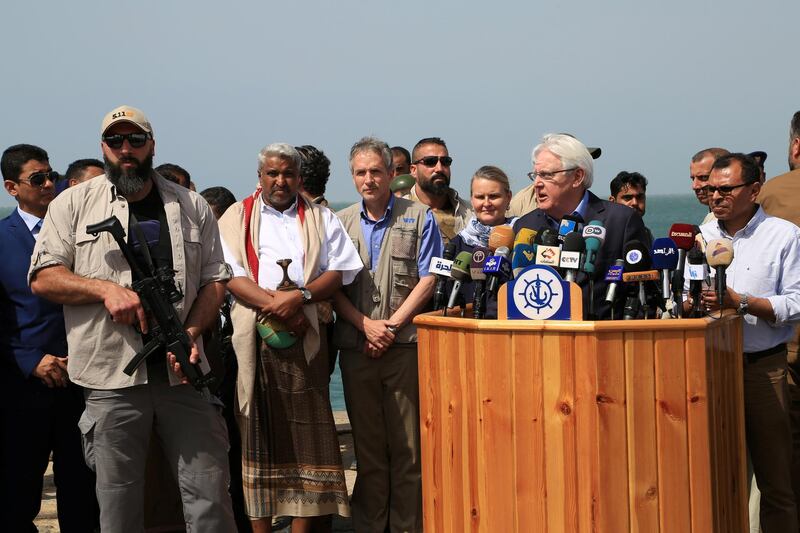The UN special envoy for Yemen left Yemen on Saturday after further talks with Houthi leaders in the rebel-held capital Sanaa and a visit to the contested coastal city of Hodeidah where he called for UN supervision of its crucial port.
Martin Griffiths' proposal for the UN to oversee operation at Hodeidah port addresses one of key sticking points in his attempts to bring Yemen's warring parties to the negotiating table in Sweden next month.
The government, which is backed by the Arab Coalition, accuses the Iran-backed rebels of using their control of the port, the main entry point for Yemen's food imports and desperately needed humanitarian aid, for leverage and to smuggle in weapons.
Speaking after discussions with the port management in Hodeidah on Friday, Mr Griffiths said: "I am here to tell you today that we have agreed that the UN should now pursue actively and urgently detailed negotiations for a leading UN role in the port and more broadly. We believe that such a role will preserve the essential humanitarian pipeline that starts here and serves the people of Yemen."
Statement by the SE, during his visit to #Hudaydah #Yemen
— @OSE_Yemen (@OSE_Yemen) November 23, 2018
“The Attention of the World is on Hudaydah”https://t.co/mkua3ctlkA
International pressure for peace negotiations is mounting amid warnings that millions of Yemenis face starvation because of food shortages caused by more than three years of conflict. Mr Griffiths told the UN Security Council this month that he was hopeful of bringing the rebels and the internationally recognised government of President Abdrabu Mansur Hadi together to discuss peace after both sides showed willingness to make concessions.
On Saturday, Mr Griffiths held talks in Sanaa with the head of the rebels' Higher Revolutionary Committee, Mohammed Ali Al Houthi, before flying out of the city without speaking to reporters.
According to a UN source, he will hold talks with President Hadi and other officials in Riyadh on Monday.
"We hope that his visit to Riyadh ends with positive results," Mohammed Al Houthi said after Mr Griffiths' departure.
Government spokesman Rajeh Badi said on Friday that President Hadi and his officials had not yet received "any information from UN envoy Martin Griffiths about the talks in Sweden and what is to be discussed".
"We are certain that the Houthi rebels have not yet taken a strategic and serious decision about peace," he told Agence France-Presse.
Mr Griffiths however sounded optimistic during his visit Hodeidah.
"I am here to tell you today that we have agreed that the UN should now pursue actively and urgently detailed negotiations for a leading UN role in the port," he said.
He urged the warring parties to "keep the peace" in the Red Sea port city, where heavy fighting broke out earlier this month.
______________
Read more:
UAE and Saudi pledge $500m to stem famine in Yemen
UN draft resolution calls for Yemen truce, two weeks to unblock aid
[ Diplomatic solution the only option to prevent widespread Yemen famine: report ]
______________
The coalition and government forces had suspended an offensive to retake Hodeidah in June to allow Mr Griffiths to pursue peace talks. That effort collapsed when the rebels refused to travel to Geneva in September after raising last-minute conditions.
The fighting for Hodeidah raised fears that the entry of food and aid could be disrupted beacuse of closure or damage to its port, which would exacerbate an already dire humanitarian situation in the country. UN agencies say 14 million Yemenis are at risk of starvation and a total of up to 22 million are in need of humanitarian assistance.
The current peace push is the biggest since 2016. Those talks broke down after 108 days of negotiations in Kuwait failed to yield a deal.
The conflict in Yemen began with the Houthi takeover of Sanaa in September 2014. The Saudi-led coalition intervened in March 2015 at the request of Mr Hadi's government as the rebels pushed out from the capital to seize more areas.
The fighting has killed at least 10,000 people, destroyed much of infrastructure in the country, already the poorest in the Arab world, and allowed extremist groups such as Al Qaeda and ISIS to expand their influence.





